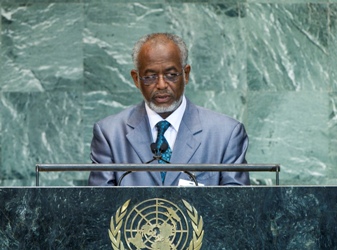Sudan renews appeal for debt relief
September 29, 2012 (WASHINGTON) – The Sudanese government accused the international community of reneging on pledges of cancelling debt made following the signing of the 2005 Comprehensive Peace Agreement (CPA) between Sudan and South Sudan.

The top Sudanese diplomat described that the debt is a “heavy burden” on the Sudanese economy.
This week the International Monetary Fund (IMF) released figures showing that Sudan’s debt will reach $45.7 billion in 2013 up from $39.5 billion in 2010.
The government in Khartoum is legally obligated to honor the entire debt despite the secession of the South in July 2011 following the results of a referendum held six months prior to that under the terms of the CPA which allowed southerners to decide whether to remain united with the north or create their own independent state.
On Thursday the two sides signed an agreement that would see Khartoum and Juba working jointly on seeking debt relief from international creditors. If these efforts are unsuccessful the ex-foes will sit down again to decide on how to split the debt.
Karti said that said that his government is “determined to work with our brothers in South Sudan…so that the brotherly people [in the two countries] enjoy the fruits of peace and to ensure the existence of two viable nations”.
Sudan’s economy is reeling from the loss of oil revenues as a result of South Sudan’s independence which held three quarters of the united country’s oil reserves. This has led to drying up of foreign currency inflows which weakened the Sudanese pound and sent inflation levels through the roof.
Earlier this year the Sudanese finance minister disclosed that his country pays $600 million in debt repayments to Arab sovereign funds which he said is a tiny fraction of the overall external debts with interest.
Most of Sudan’s debt dates back to the days of late president Ja’afar Nimeiri. It grew from $9 billion in 1985 to approximately $41 billion in 2012. The majority of it is owed to the Arab Gulf States of Saudi Arabia and Kuwait.
In its annual review of the Sudanese economy held last week, the IMF Executive board urged Khartoum to “step up their dialogue with creditors and donors to garner support for debt relief”.
Several countries such as United States, United Kingdom and Germany expressed readiness to offer debt relief but political conditions attached will likely slow down materialization of the pledges.
(ST)
